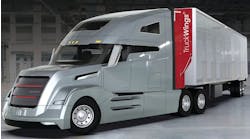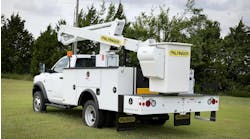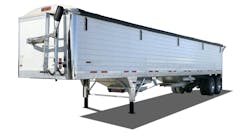Dave Dudley is coming home late tonight
“WELL my rig’s a little old, but that don’t mean she’s slow.
There’s a flame from her stack and that smoke’s a blowin’ black as coal.
My hometown’s a comin’ in sight.
If you think I’m a happy you’re right.
Six days on the road and I’m gonna make it home tonight.”
Much has changed since Dave Dudley drove that song to the top of Billboard list of “Hot Country Singles” in 1963.
One change: We don’t romanticize about trucks belching black smoke these days. Today we regulate truck emissions—we don’t sing about them.
Here’s something else that’s different: The flame from the stack of modern trucks doesn’t come blazing out of the stacks anymore, nor does it burn very often. A computer decides when the flame ignites, and the fire exists strictly to incinerate all that coal-like stuff that collects in the truck’s diesel particulate filter.
Dave Dudley would probably find today’s trucks boring—no flames, no smoke. But Dudley died in 2003—about the time the Environmental Protection Agency really began ratcheting down on truck emissions and engine manufacturers figured out ways to remove the smoke and fire.
After multiple rounds of EPA emissions regulations, we don’t see carbon particles coming from the truck exhaust. If we see smoke blowing black as coal, it’s probably from an old passenger car that desperately needs new piston rings. The carbon we fight now is invisible. It’s called carbon dioxide.
So what’s next? Past regulations have made our air visibly cleaner, but the path forward for future truck-related emissions regulations is not quite as clear. On the surface, its’ simple: We can reduce greenhouse gas by burning less fuel. But how is the best way to do that?
For the truck guys who have been working on emissions since the Carter Administration, the recently published Phase 2 Greenhouse Gas Emissions Standards and Fuel Efficiency Standards was met with a collective yawn, (which regrettably sent a little extra CO2 into the atmosphere). But the proposal has really grabbed the attention of the trailer manufacturers.
“It is the dominant topic in our industry,” says Jeff Sims, president of the Truck Trailer Manufacturers
Association. “Nothing else even comes close.”
TTMA spent extensive time analyzing the lengthy proposal, submitting 20 pages of comments just ahead of the close of the comment period October 1. Perhaps most interestingly, trailer manufacturers make the case that EPA does not have the statutory authority to apply greenhouse gas regulations to trailers. TTMA also argued that under the Motor Vehicle Safety Act and other statutes, the National Highway Safety Administration has no authority to apply this regulation to trailers.
TTMA found other concerns with the proposal:
• Safety. Approximately 30% of all fleets operate at or near full GCWR. In certain fleet applications, the additional weight of aerodynamic devices will cause fleets to haul less cargo, causing them to consume more fuel by requiring more trips. At current accident rates, the additional extra miles that these fleets would be required to travel would result in seven extra fatalities per year. Ironically, NHTSA introduced a separate proposal this year to upgrade rear underride guards. NHTSA estimates the proposal will save about seven lives per year. If saving seven people annually is reason enough to implement one new rule, is saving the lives of seven people each year enough to not implement this one?
• SmartWay is the smart way. Under the SmartWay program, many fleets have already installed some of the regulation’s products because they pay for themselves. At the very time this voluntary fuel-saving program is gaining popularity with the trucking industry, regulators want to mandate products that aren’t cost effective.
• Averaging doesn’t add up. Sales of the Toyota Prius can help offset a gas-guzzling Tundra. This system that auto manufacturers have used to comply with CAFE regulations will not transfer to trailer manufacturing, TTMA argues. Some companies specialize in producing trailers that probably won’t comply and have no highly compliant trailers to make up the difference.
Thanks to decades of government regulation and industry innovation, the soot is gone and we are breathing easier. If Dave Dudley were alive, he might record his version of “Blue Skies.” But this latest regulation will become increasingly stringent all the way to 2027. How will the industry comply? We don’t know, but if Dave Dudley were a trailer engineer, there will be plenty of nights in the coming decade that he will be late getting home. ♦










